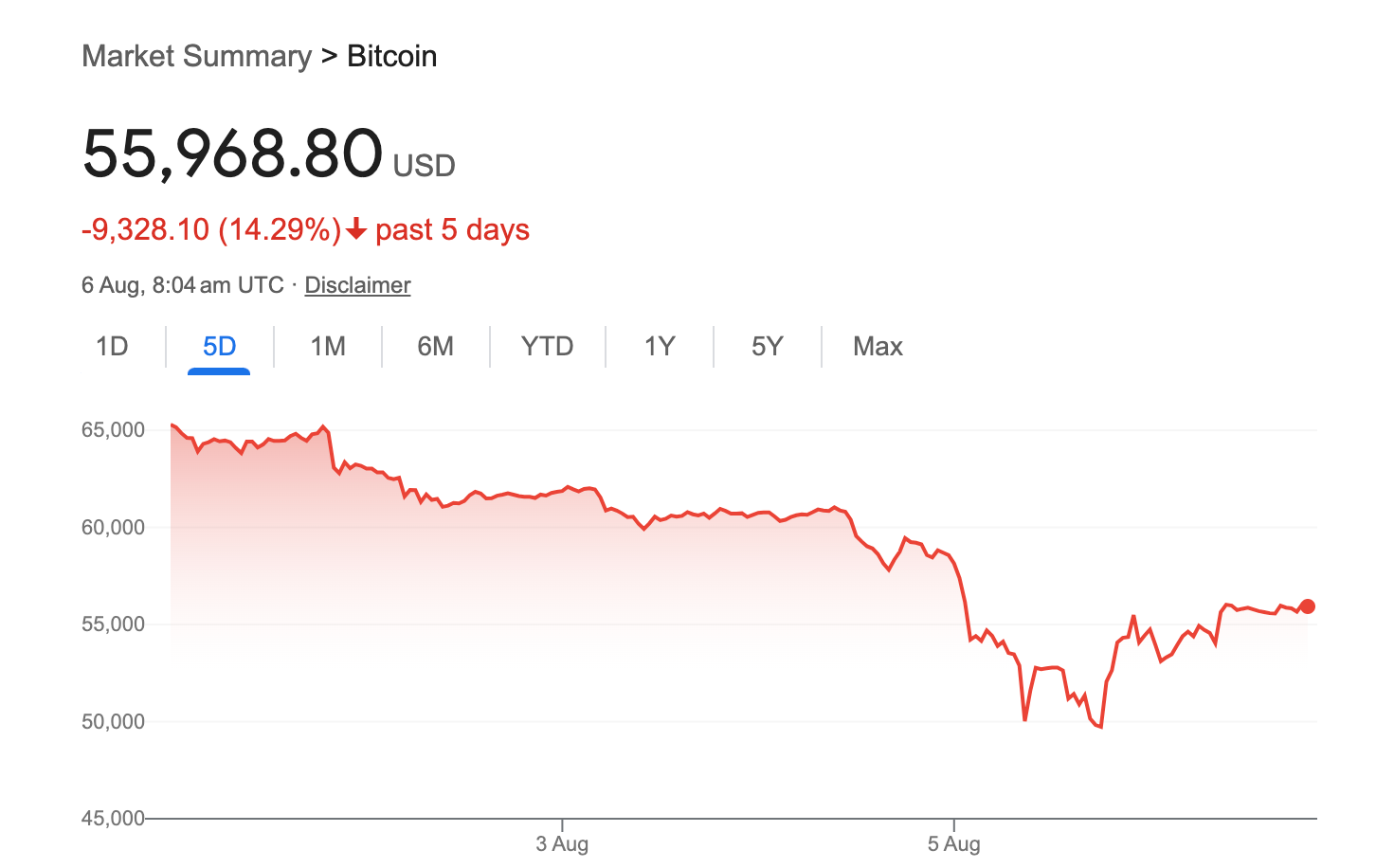Table of Contents
As analysts and industry experts clammer in the dark to find a reason behind the abrupt and abnormal market crash, fingers are now being pointed at the Japanese.
In the past 24 hours, the crypto market saw more than $1 billion in liquidations, with $800 million in longs liquidated as Bitcoin (BTC) dropped below $50,000 briefly.

Bitcoin also saw a surge in Bitcoin ETF trading with volume reaching $5 billion in daily trading volume, the highest level since April. Eric Balchunas, senior ETF analyst at Bloomberg, explained that high trading volume in a market downturn is a "pretty reliable measure of fear."
"If you bitcoin bull you actually DONT want to see crazy volume today as ETF volume on bad days is a pretty reliable measure of fear [sic]," he said.
"Deep liquidity on bad days is part of what traders and institutions love about ETFs, so you also want to see volume too, good for the long term."
Bitcoin ETFs have traded about $2.5b so far, a lot for 10:45am, but not too crazy (full history below). If you bitcoin bull you actually DONT want to see crazy volume today as ETF volume on bad days is a pretty reliable measure of fear. On flip, deep liquidity on bad days is part… pic.twitter.com/TOQRjyriqp
— Eric Balchunas (@EricBalchunas) August 5, 2024
Initially, Jump Crypto took the brunt of the blame for unstaking more than $300 million but as market participants began realizing that the crypto powerhouse actually began its sell-off earlier in the week, traders looked elsewhere to pin the blame for Monday's crash. Genesis and Mt. Gox repayments also added to the selling pressure.

Macroeconomic data also took its fair share of the blame too, with US rising unemployment levels and weak manufacturing index figures suggesting a recession is inbound.

To make matters worse, the narrowing Japanese "Yen Carry Trade" supposedly sent the market into freefall. But what is this exotic-sounding phenomenon?
Yen-ter the Dragon
A yen carry trade is a financial strategy that involves investors borrowing Japanese yen at low interest rates and then converting the converted yen into other currencies to invest in assets with higher returns.
Investors essentially profit from the difference between low borrowing costs in Japan and higher returns in other countries. "The wide spread between rapidly rising rates in the US and other countries and negative rates in Japan made it possible," explained The Kobeissi Letter.
However, this strategy only works if the Yen's value falls or remains low and interest rates remain enticing. Last week, the Bank of Japan (BOJ) raised interest rates for the first time in seventeen years, thereby increasing borrowing costs.
"As the Yen strengthens, many of these Yen carry trades are being "margin called." Suddenly, the era of "free" Yen loans is coming to an end. As these margin loans are called, the underlying assets are being sold and crashing equity markets. The carry trade is unwinding," The Kobeissi Letter added.
Stock markets around the world are crashing right now, but why?
— The Kobeissi Letter (@KobeissiLetter) August 5, 2024
The answer to this question is the Yen carry trade, a term you'll probably hear many times this week.
So what exactly is the Yen carry trade and why did it cause a market downturn?
A thread to explain:
(1/7) pic.twitter.com/0G5MnsV49I
With more rate hikes in the pipeline, the BOJ's moves have made the Yen carry trade less profitable. Additionally, the Yen has strengthened as investors turned to the currency to deploy their strategies.
Jake Ostrovskis, an OTC Trader at the market maker Wintermute told Decrypt, “As they sell risk assets and convert back to yen, the yen has strengthened. Risk assets like equities and cryptocurrencies have experienced increased volatility and downward pressure as a result of those positions being closed."
As a result, the Japanese Yen strengthened and the USD/JPY currency pair just hit its lowest level since December 2023.
— The Kobeissi Letter (@KobeissiLetter) August 5, 2024
You now receive 142 Yen for every US Dollar compared to 160 Yen for every US Dollar a few weeks ago.
But here's why this is the key point:
(5/7) pic.twitter.com/pXzfHtUdwR
Traders who buy yen to close their positions can inflict more pain on Yen borrowers, which could cause an increase in liquidations.
“Everyone was leaning the same way,” Amberdata Director of Derivatives Greg Magadini said, adding that the Yen carry trade is “a crowded [one] because it's such an obvious trade.”
Yen-durance
As carry trade strategies fell flat, Japan's Nikkei then stock market experienced its steepest drop since the 1987 Black Monday crash, which caused ripples across all markets including crypto.
However, Japanese stocks rebounded sharply on Tuesday, with the Nikkei seeing its best day since October 2008, rising 10.23%. Bitcoin also showed some hope of revival and is currently trading around the $50K mark.
BRN analyst, Valentin Fournier, believes that while short-term volatility might distress the market, investors should consider these price drops as buying opportunities.
"We believe that Bitcoin will keep pushing higher until the end of the year with an acceleration in October, but August and September could be volatile," he explained.
"This major dip remains an interesting buying opportunity, so we recommend progressively increasing positions and staying updated through our content on BRN."
The release of macroeconomic data last week was extremely negative. Unemployment is rising at an alarming rate while the manufacturing index shows signs of a slowing economy. Jobless claims and the job opening numbers confirm this.
— BRN (@thebrn_co) August 6, 2024
A thread 🧵 (1/5)
Elsewhere



Events
Coinfest Asia (Bali, 22-23 August)


Get ready to connect with 6,000+ people from 2,000+ companies at the largest Web3 festival in Asia. Get your tickets now with Blockhead's 10% discount code: CA24BLOCKHEAD
Token2049

Don't miss out on early bird ticket prices, until July 31! Use Blockhead's exclusive discount code BLOCKHEAD10 for a further 10% off.
It's All Happening on LinkedIn
Did you know you can now receive Blockhead's juicy daily newsletters directly to your LinkedIn? Subscribe to our LinkedIn newsletters for the latest news and insights in the world of Web3!
There also might be the occasional discount code for the industry's hottest events, exclusively for subscribers. So be sure to sign up!










